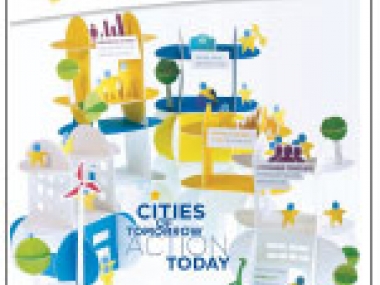The 2012 URBACT Tribune – Cities of Tomorrow, Action Today!
Edited on
09 October 2017What challenges will the cities of tomorrow be facing? What actions do local and national governments need to take today in order to face the challenges of tomorrow? The URBACT Secretariat has produced a new issue of "![]() Download The Tribune 2012 (6.81 MB)". Entitled "Cities of Tomorrow, Action Today ", this publication gathers articles written by URBACT Lead Experts. This year, the articles reflect on the state of play in the URBACT projects and present some of the first findings of the URBACT workstreams focusing on key urban challenges. Read "The URBACT Tribune" now available online.
Download The Tribune 2012 (6.81 MB)". Entitled "Cities of Tomorrow, Action Today ", this publication gathers articles written by URBACT Lead Experts. This year, the articles reflect on the state of play in the URBACT projects and present some of the first findings of the URBACT workstreams focusing on key urban challenges. Read "The URBACT Tribune" now available online.

"Currently, we have the opportunity to make substantial progress. We can develop new visions and reconsider the purpose of cities so that the become attractive for all” explains in the editorial of the Tribune Claes NILAS, Permanent Secretary of State and Deputy Minister of the Danish Ministry of Housing, Urban and Rural Affairs and Chair of the URBACT Monitoring Committee.
Building on the "Cities of Tomorrow" report published by the European Commission, URBACT has launched an interesting new initiative that aims to expand discussion on targeted topics and questions raised by the report. Six workstreams have been set up to bring forward concrete knowldege and solutions from URBACT II projects, as well as other European Territorial Cooperation programmes (ESPON, INTERREG IVC and INTERACT) and related stakeholders.
These workstreams focus on six key challenges that we must deal with if we want to make our cities economically viable, as well as socially and ecologically sustainable:
- Demographic decline and shrinking cities
- More jobs for better cities
- Supporting young people through social innovation
- Divided cities in Europe
- Motivating mobility mindsets
- Energy efficiency in European cities
The 2012 Tribune is thus the first product of a collective, demanding and ambitious capitalisation process. You will find in this edition six workstream articles reflecting the diversity of the subjects tackled by the cities within the URBACT context as well as an article illustrating how discussions, hearings and concrete practices have been reported and analysed with success. As this is just the beginning, the articles are not exhaustive neither do they claim to cover everything on the topic; on the contrary, they are meant to provoke further reflection, raise questions and initiate a dialogue with the reader.
They also link knowledge and experience to discussions about new EU tools such as Integrated Territorial Investments, Community Led Local Development, and the Structural Funds for 2014-2020. This exercise has demonstrated that it is feasible to take on board different stakeholders, work and create together, and transfer knowledge and practice.
Building on all the work done in 2012, including dashwork, workstream meetings and hearings, evidence collection and discussion during the URBACT Annual conference, the workstreams will produce a series of enriched thematic reports in mid 2013.
Read more:
 Download The Tribune 2012 (6.81 MB) - PDF
Download The Tribune 2012 (6.81 MB) - PDF Download The Urbact Tribune 2011 (6.25 MB) - PDF
Download The Urbact Tribune 2011 (6.25 MB) - PDF Download The Urbact Tribune 2010 (6.21 MB) - PDF
Download The Urbact Tribune 2010 (6.21 MB) - PDF- The URBACT II Tribune 2009 - PDF
Submitted by admin on
